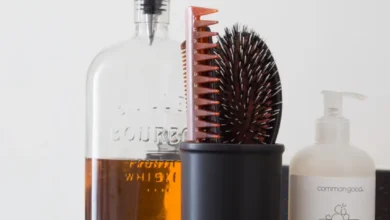How to clean sponge brushes for hair ?

How to clean sponge brushes for hair ? You’d be surprised at how much harm filthy makeup brushes and makeup sponges can do to otherwise flawless skin. We use makeup brushes and sponges on a regular basis to contour and paint our faces, but how frequently do we clean these tools?
Expert doctors and cosmetic artists suggest cleaning our makeup brushes and sponges at least once a week. Who has never cleaned their makeup brushes in the previous several months? No judgments here; when your makeup looks this nice, time flies!
The bad news is that if we don’t clean our makeup brushes and sponges on a regular basis, germs may rapidly build up. It’s no surprise that if you apply this to your face every day, you’ll get undesirable breakouts.
Don’t worry, there’s still opportunity to make amends and maintain your cosmetics regimen as spotless as your skincare regime! We’ll show you how, what, and why to clean your makeup brushes and sponges so your skin feels extra clean and healthy.
How often should you clean your makeup brushes?
Dermatologists and cosmetic professionals suggest cleaning your brushes at least once a week to prevent product and bacteria accumulation. Because makeup brushes are used on your face, any germs on the brush will be transferred to your skin, which is a major skincare no-no.
Not only will your skin appreciate it, but you’ll also get additional advantages, such as increasing the life of your makeup brushes. Clean bristles help for effective applying makeup; whether they’re full of oils, old product, and germs, your makeup will be patchy and difficult to blend out, so follow these guidelines:
- Each week, try to clean your makeup brushes.
- If time is a problem, wash them at least once a month.
- Brushes used near the eyes should be cleaned at least twice a month.
What method should be used to clean makeup brushes?
The greatest part about cleaning your makeup brushes, besides the health advantages, is that it costs almost nothing! Only warm water and light soap are required. There are specialized brush cleaners if you’re feeling fancy, but water and soap will do the work, prolonging the life of your cosmetic brushes at no additional expense. What do you have to lose?
You’ll note that we referred to mild soap — this is not only to be friendly to delicate skin. Ordinary soap may actually dry up the bristles of your beauty brush, particularly if the bristles are made of natural hair, therefore using a mild soap to clean your makeup brushes can prevent you from accidently causing harm.
How do you clean the makeup brushes?
It is not as easy as dipping the brushes in washing water. If you want to maintain the condition of your brushes and keep them clean, you should use the following method:
- Wet the bristles of the brush with tepid water, taking care not to wet the base of the bristles, which are attached to the brush base and might become free and fall out.
- Place a drop of mild soap or cosmetics brush cleaner in your palm.
- Gently rub the brush’s bristle tips in your hand.
- Rinse the bristles, taking care to avoid the bristle root so that they do not get loose and fall out.
- Utilize a clean towel to absorb any extra wetness.
- Reform the head of the cosmetics brush
Hang the bristles over the side of a counter to dry — drying on a hard surface will cause the head to dry in an unnatural form, drying on a towel might cause the bristles to get mildewed, and drying vertically could result in water dripping to the bristle base and causing the glue to loosen.
How frequently should a makeup sponge be cleaned?
Similar to makeup brushes, it is essential that you wash your makeup sponge often to prevent the transmission of germs to your face. However, the important distinction is that the majority of popular cosmetic sponge companies advocate replacing the sponge every 3 months.
Sponges are far more absorbent than makeup brushes, so your cosmetic sponge will absorb any extra product, germs, oil, dirt, or even hairspray, perfume, and other airborne sprays. Even if you clean your makeup sponge every week, it will be impossible to salvage with time.
What should you use to clean your makeup sponge?
Warm water and either mild soap or a cosmetic cleaner are still the most effective cleaning agents for makeup sponges. If you want to go a bit fancier, though, you may provide your makeup sponge a nourishing soak by combining a little amount of mild soap with a small amount of baby shampoo and a dash of olive oil.
How to clean sponge brushes for hair
The method for cleaning makeup sponges is quite straightforward! Whether you’ve created your own cleaning solution or opted for soap and water, the following process applies:
- Fill a sink with water and your preferred cleaning agent.
- Inundate the sponge.
- Squeeze the sponge underwater twice
- Return the sponge to the basin.
- Dry overnight on a spotless surface.
- Invert the sponge the next morning.
Whether you like using brushes or sponges to apply your makeup, be certain to adhere to a regular cleaning schedule to get the most out of your equipment without causing skin issues!



